|
|
|
Sort Order |
|
|
|
Items / Page
|
|
|
|
|
|
|
| Srl | Item |
| 1 |
ID:
171911


|
|
|
|
|
| Summary/Abstract |
Certification of sustainable palm oil as organised through the Round Table on Sustainable Palm Oil is based on a simplified understanding of the global palm oil value chain – according to which instructions about production practices can be directly translated from the palm oil mill to the primary producer. The reality of palm oil provision is much more complex than this as is shown in the case of Thailand. On the basis of qualitative field study in Southern Thailand this paper clarifies that intermediary stages, such as the collection of oil palm fruit bunches at the ramp, play a key role in the organisation of the chain. The fluidity and complexity of the palm oil flow at the local level complicates the promotion of sustainability through certification. Global and national stakeholders, such as processing and trading firms, non‐governmental organisations and national governments, should therefore open this black box of local dynamics to more effectively contribute to sustainability in palm oil supply.
|
|
|
|
|
|
|
|
|
|
|
|
|
|
|
|
| 2 |
ID:
171907


|
|
|
|
|
| Summary/Abstract |
The 2011 Bangkok floods, a slow onset event, flooded significant parts of the city. The state's response to flooding followed a traditional cultural and hierarchical approach to justice within Thailand, stemming from Buddhist values, an informal caste system and monarchical order. This resulted in a spatially uneven outcome, with the ‘preservation’ of the central city and two‐month‐long floods in outer suburbs, exacerbated by inadequate management and coordination. Suburban communities sought a more egalitarian notion of disaster justice, with hazard burdens shared more equitably and people having adequate access to decision‐making over the distribution of disaster risk and compensation for damage. Extensive damage, and reduced livelihoods, caused friction between the two views, and protests, contestations and conflicts during the floods, in four different community contexts in northern Bangkok. By generating alternative discourses, challenging the hierarchical notion of justice and taking direct action to removing floodwalls, protesters sought to reshape the spatiality of the floodwater and claim inclusive citizenship and their right to the city. Existing perceptions of disaster justice, usually focused on liberal state responses to understanding disasters as natural episodes, are alone inadequate to explain the outcomes of and responses to disasters in different cultural contexts.
|
|
|
|
|
|
|
|
|
|
|
|
|
|
|
|
| 3 |
ID:
171913
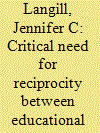

|
|
|
|
|
| Summary/Abstract |
Reciprocity between student success and community support has emerged as a strong theme in a phenomenological case study that was conducted amongst post‐primary educational migrant students1 in Laos. Students clearly articulated their dependence upon community support and the ways in which they gave back to their communities in exchange for their continuing education. The descriptions of their experiences were indicative of hierarchical interdependence and highlighted the effects of urbanisation on educational migrants and their lifelong learning. This study draws on Bourdieu's capital theory to understand community and reciprocity as indicators of cultural and social capital. Findings revealed that building relationships between students and their communities is essential to advancing post‐primary education in Laos.
|
|
|
|
|
|
|
|
|
|
|
|
|
|
|
|
| 4 |
ID:
171912
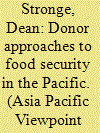

|
|
|
|
|
| Summary/Abstract |
As part of the 2030 Agenda for Sustainable Development, sustainable development goal 2 (SDG2) specifically seeks to ‘End hunger, achieve food security and improved nutrition and promote sustainable agriculture’. However, there is no clear prescription for how this goal should be achieved which allows various donors adopting diverse strategies to all claim they are contributing to SDG2. This article examines whether policies of five donors on food security and agriculture in the Pacific Islands region are likely to help to achieve SDG2. Fundamentally, the current and future wellbeing of many Pacific Island peoples, many of whom live on small, geographically dispersed islands with limited market access, is strongly tied to their abilities to produce food for themselves. This is somewhat overlooked by bilateral donors from Australia and New Zealand who invest relatively small amounts in the agriculture sector of Pacific countries and show little interest in supporting people's food security through local sourcing and production for subsistence. From an SDG2 perspective of ending hunger for all people, it is positive to see that, by contrast, two multilaterals have shown commitment to a more balanced and holistic approach to food production in the Pacific Islands region.
|
|
|
|
|
|
|
|
|
|
|
|
|
|
|
|
| 5 |
ID:
171916


|
|
|
|
|
| Summary/Abstract |
This paper investigates the adaptation processes with reference to the narrative analysis of human–environment interactions in the Vietnamese Mekong Delta. From the political ecology perspective, it focuses on the discourses of the power relationships embedded within the ‘state‐society‐flood’ nexus over the course of its ‘opening‐up and closing‐off’ processes (e.g. excavating large‐scale canals for human settlements and agricultural expansion (opening‐up) and human interventions into natural systems through water control structures (closing‐off)). Drawing on empirical data gathered from 33 interviews and nine focus group discussions in three study areas and relevant literature, the paper argues that human interactions with the flood environments are intertwined with adjustments of adaptation patterns as evidenced through three periods: free adaptation (pre‐1975), transitional adaptation (1976–2010) and forced adaptation (after 2010). These processes have witnessed a gradual power shift in the ‘state‐society’ relations in manipulating floods, which moves from the top‐down towards a more collaborative fashion. By unravelling the political ecology of the ‘state‐society‐flood’ nexus, this paper exhibits the skewed development in the delta, which is largely bound to short‐term development planning to prioritise local socio‐economic and political objectives. The paper contributes important policy implications for achieving socially just and environmentally sustainable development in the delta.
|
|
|
|
|
|
|
|
|
|
|
|
|
|
|
|
| 6 |
ID:
171909
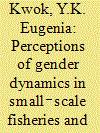

|
|
|
|
|
| Summary/Abstract |
The Tonle Sap Lake of Cambodia is one of the most productive ecosystems in the world, supporting millions of small‐scale fisher livelihoods. Women's contributions in these fisheries are often overlooked due to socio‐cultural expectations of roles and responsibilities. This is a crucial omission since climate and anthropogenic influences increasingly threaten lake inhabitants. Addressing these challenges requires the full participation of both men and women who use the lake, thus it is necessary to first understand the social dynamics of these communities. We investigated whether there were differences between men's and women's perceptions of (i) fishing and non‐fishing practices; (ii) power, access and control over fishing resources; and (iii) perceptions towards conservation and conservation areas in Pursat, Cambodia. We interviewed fishers and key informants, and found differences in perceptions of fishing and non‐fishing practices between fishermen and fisherwomen. Men more openly acknowledged unequal power dynamics, access to and control over fishing resources when compared with women. We found contrasting ideas of community fisheries and conservation between men and women, and health and safety challenges they faced in conservation areas. Findings suggest that community perspectives and unequal power relations established specific roles for women that limited their active participation in fisheries management.
|
|
|
|
|
|
|
|
|
|
|
|
|
|
|
|
| 7 |
ID:
171910


|
|
|
|
|
| Summary/Abstract |
This article considers the experiences of a Samoan female geographer undertaking community‐based field research in her home country, and identifies some lessons for researchers working in similar circumstances. The paper suggests that ethical behaviour in research is ‘place‐specific’, and there is therefore a need to employ culturally sensitive and ‘location‐specific’ methodologies when undertaking community‐based research fieldwork. For the lead researcher, growing up in Samoa played a significant role in gaining an understanding of a set of robust and effective procedures to evaluate citizens' resilience to climatic and other environmental challenges. Fluency in everyday and more formal local languages, and awareness of local differences, each with multi‐layered connections to local communities, understanding cultural nuances and practising respect for va tapuia [sacred space or relationships] protocols, together facilitated the process of knowledge acquisition and helped to confirm the validity of the conclusions derived from the study.
|
|
|
|
|
|
|
|
|
|
|
|
|
|
|
|
| 8 |
ID:
171915


|
|
|
|
|
| Summary/Abstract |
While internal migration in contemporary China ascribes a great change to urban China's demographic composition, social structures and economic development trajectories, it is yet to restructure the formal definitions of urban identity and belonging, which are still dominated by the household registration system (hukou). The paper suggests that as a result of changes in the political, economic, demographic and social contexts within which China's internal migration develops, there emerge a crucial need to re‐examine the crude forms of determining identity and belonging, questioning the addressing of spatiality within the existing mechanisms (such as hukou system or the shiminhua discourse). To do so, the paper argues that the existing de‐territorialisation of the migration experience has to be replaced with a more nuanced understanding of how spatial practices and conceptualisations shape migrants’ experiences, as it is becoming imperative to develop a new framework that is more sensitive to migrants’ lived process of identification and belonging, especially as these traverse multiple geographies and spatial scales. This close engagement with migrants’ spatiality can then be used as a base from which to engage with a more complex view of migrants’ spatial and social relatedness, as well as the development of their urban belonging and identity.
|
|
|
|
|
|
|
|
|
|
|
|
|
|
|
|
| 9 |
ID:
171908


|
|
|
|
|
| Summary/Abstract |
Analysing the agricultural sectors of Taiwan, Malaysia and Singapore, this paper examines the capability‐building process that encourages productivity and innovation. It describes and explains the origins and subsequent evolution of three forms of agricultural production system, each generating different farming capabilities and distinct forms of competitive advantages. The paper argues that Taiwan's rice‐oriented agricultural production system stimulates both productivity and innovation, helping Taiwanese farmers raise their income level and living standards. The active deployment of state institutions and a malleable labour force, evidenced in the Malaysian palm oil industry, is effective in raising farming productivity but not the ability to innovate. Singapore's aquaculture‐oriented agricultural production system is somewhat useful in stimulating productivity and innovation. Yet the city‐state's inherent lack of space and open international trade regime have circumscribed the potential of its aquaculture industry. It now relies on the regional ethnic Chinese business networks to expand the aquaculture industry's knowledge base and its industrial commons. The principles discussed in this paper provide policy lessons, or at least some initial guidance, for other developing economies aspiring to modernise their agricultural sector.
|
|
|
|
|
|
|
|
|
|
|
|
|
|
|
|
| 10 |
ID:
171906
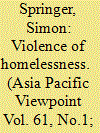

|
|
|
|
|
| Summary/Abstract |
This article examines the plight of homeless peoples in Phnom Penh, Cambodia as a consequence of their enmeshment in a new logic of urban governance being rolled out by city officials and municipal planners. The widespread adoption of neoliberal economics has resulted in a globalised version of urban entrepreneurialism, to which Phnom Penh is a participant. The (re)production of enterprise zones, cultural spectacles, waterfront development, and privatised forms of local governance all reflect the powerful disciplinary effects of interurban competition as cities aggressively engage in mutually destructive place‐marketing policies. Against this neoliberal backdrop, the ongoing pattern of violence utilised by municipal authorities against homeless peoples in Phnom Penh is part of a gentrifying process that the local government has dubbed a ‘beautification’ agenda. Of particular concern is how city officials have begun actively promoting the criminalization of the urban homeless and poor through arbitrary arrests and illegal detention, holding them in so‐called re‐education or ‘rehabilitation’ centres. Yet these centres are not what they seem. Such euphemisms attempt to mask the systemic abuse of marginalised peoples who are deemed to present Phnom Penh in a negative light and are consequently unwanted on the streets of the capital city.
|
|
|
|
|
|
|
|
|
|
|
|
|
|
|
|
| 11 |
ID:
171914
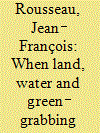

|
|
|
|
|
| Summary/Abstract |
Hundreds of hydropower dam projects, of all sizes, have been initiated in Yunnan Province, China, since the late 1990s. This paper frames hydropower‐driven resource reallocations as resource grabs that combine aspects of land, water and green‐grabbing, investigating how two dams built along the Red River have impacted local communities and how corporate and governmental stakeholders have viewed local livelihood changes and considered compensation mechanisms. This research documents how hydropower expansion triggers changes in both land and water availability, in turn depriving riverside communities of a wide range of intersecting livelihood benefits. Villagers were compensated for some losses, but in ways that failed to address how impacts accumulated over time and how hydrologic changes would impact overall livelihood activities. Financial compensation and specific environmental and modernisation agendas legitimised resource reallocations together with the provincial, national and global development campaigns driving them. Considering how different actors experience, frame and address the impacts of hydropower development through a resource‐grabbing lens elucidates the compartmentalised approaches of distant hydropower actors as well as scholars. This study answers recent calls to mobilise the scholarship on resource‐grabbing in the service of shedding light on the socio‐political projects driving resource reallocations and their livelihood impacts.
|
|
|
|
|
|
|
|
|
|
|
|
|
|
|
|
|
|
|
|
|